Coordinator: Nathalie Vanfasse (PR)
Members:
Laurence BENARROCHE, Adam BIGACHE, Lucas CANTINELLI, Julian CARADEC, Frank CONESA, Cécile COTTENET, Kevin CRISTIN, Martin CRITELLI, Ilef DRIDI, Marie-Gaëlle DROUET, Léa FOURURE, Marie HEDON, Klaudia KOPIASZ, Anais MARTIN, Sylvie MATHE, Mounir TAIRI, Marryam THIRRIARD, Sophie VALLAS, Michel VAN DER YEUGHT
Histories and Lives of Literatures
“Histories and Lives of Literatures” is a research programme on and around literatures in the broadest sense: it covers so-called “white” literature, so-called “grey” literature (working texts, drafts, archives…), as well as the book as an object and as the result of various mediations. This research fits into the “material” and “archival turn” in research on the humanities. It also relates to the field of egodocuments and to studies of the private sphere. It is part of studies that link literature to other forms and modes of knowledge and experience.
The “Histories and Lives of Literatures” programme aims to renew the approach to books and literature, by studying them from a quintessentially interdisciplinary perspective. The team works on the fields of literature, culture and publishing, the latter being understood in a very broad sense. The programme is composed of various parts:
1. Literary mediations
Coordinators: Cécile Cottenet, Sophie Vallas, Nathalie Vanfasse
The part on literary mediations was initiated in 2016. It reflects upon forms of mediation, and mediators of literature, following approaches drawn especially but not exclusively, from the fields of book and publishing history, as well as from the sociology of translation. Emphasis is laid on processes of mediation – editorial interventions, contractualisation, marketing, book promotion, literary criticism, etc. – and on the mediators (publishers, agents, editors, critics, etc.) who bring books to life and promote them, both in their original environment and abroad.
A central theme of this project is devoted to the study of the transatlantic passage of literature from the United States to France. It is encapsulated in the ongoing Dictionnaire des passeurs de la littérature des États-Unis en France:
DicoPaLitUS, https://dicopalitus.huma-num.fr/
This wide-ranging collaborative project coordinated by Cécile Cottenet since 2019, involves alongside LERMA researchers, researchers from the laboratories CIELAM (AMU), CLIMAS (Université Bordeaux Montaigne), CREW (Université Sorbonne Nouvelle), Héritages (CY Cergy Paris Université), LISAA (Université Gustave Eiffel), and VALE (Sorbonne Université). It focuses on the transatlantic circulation of texts from American literature and the intermediaries that make this circulation possible.
2. Grey literature, white literature
Coordinators: Sophie Vallas, Marie Hédon et Nathalie Vanfasse
This part of the project focuses on so-called “grey” texts. These texts come before “white” literary text, which is finished, published, legitimized by its official existence. We look at how grey literature precede, prepare and think about white literature. We consider how work on grey literature (drafts, manuscripts, reading and working notes, exchanges and correspondence, interviews, etc.) sheds light on white literature. We also take into account how this grey literature is preserved, and for what purposes, and how digital humanities today can help to enhance it, and to shed light upon the meanders of thought underlying the elaboration of a literary or academic work, and the construction of knowledge that this implies?
The researchers in this particular part of our overall project work on the personal archives of authors and/or academics involved in the field of literature. The “Marc Chénetier” archives held at LERMA are being built into a digital project aimed at preserving this exceptional collection and making it available to researchers interested in the literature of the United States between the 1960s and 2010s. Secondly, the project, which considers the archive compiled by an academic as a form of professional autobiography, aims to create a website that will reconstruct and present the intellectual biography of this researcher who contributed to the development of Americanist studies in France and Europe. More broadly, this project is intended to stimulate reflection on the contribution of digital humanities to the dynamic presentation of an archive today. We examine new possibilities for its exploitation, involving tools that enable a multiplicity of data cross-referencing and modelling.
The aforementioned approach to archives is also being explored by the group’s nineteenth-century members, who are considering how it can apply to their own investigations.
3. Literature, passages, circulations and interdiscursivity
Coordinators: Marie Hédon, Nathalie Vanfasse, Cécile Cottenet and Sophie Vallas
This part of the project examines literary texts in relation to discourses and theoretical approaches from other disciplines (such as economics). The “Litéco seminar” initiated in 2016 now branches out into the field of publishing and elaborate on broader links between literature and the sciences. This involves collaborations with AMU’s Centre for Ethics, Economics and Business Deontology, as well as with Bordeaux Sciences Economiques (BSE) and the University of Nantes.
Passages and circulations of literatures also give rise to work on literary texts regardless of areal distinction. This involves apocalyptic literature, autobiography and paratexts, hybrid narrative modes, etc. Some of this work is carried out in partnership with the universities of UC Berkeley and Montpellier, especially around “literature and forms of knowledge in the long 19th century”.
Passages, circulations and interdiscursivity, between critical and theoretical discourses on literatures, and between literatures and other disciplines, as well as within the “forms” that literature take (rewritings, adaptations, transmedia writing, circulations between geographical and temporal borders) thus constitute the 3rd facet of the overall project.
4. Theoretical and methodological foundations
Cross-disciplinary work within the project involves all members of the team.
All the previously mentioned sub-projects involve various forms of enquiry (regarding texts and their various producers and distributors, archives, or interviews). They therefore share a common epistemological basis that can be described as follows:
– A theoretical reflection on the history of white and grey literature, of publishing, of critical discourse, as well as of the circulation of texts and their dialogue with other disciplines.
– A practical and methodological section focusing on palaeography, reading, and the preservation and use of sources such as archives, both private and institutional.
For further information on the team and its research you can consult our research blog: https://decentered.hypotheses.org


